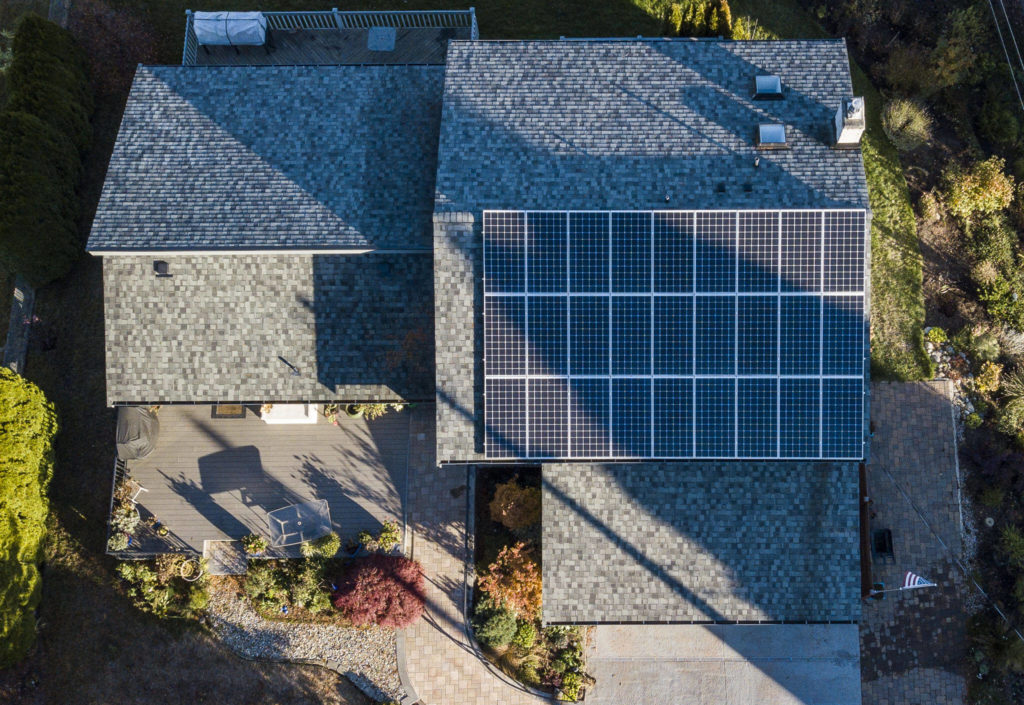EVERETT — Pam Kepford has stepped down from Everett climate action leadership, but her concerns about the warming planet and her power bills continue. So she was eager to learn what help the federal government might offer to a low-income retiree like herself who wants to replace a gas furnace and water heater with efficient electric models.
After using the Inflation Reduction Act savings calculator at rewiringamerica.org, she responded with delight: “Looks like this might be achievable for me in 2023!”
The act, passed solely with Democratic votes and signed by President Joe Biden in August, does take modest steps to reduce inflation, such as allowing the government to negotiate with prescription drug manufacturers. But it is known best as a law aimed at slowing human-caused climate change. It’s considered the most significant such law ever in the United States, if not the world.
“We can’t be leaders without leading by example,” said U.S. Rep. Suzan DelBene, D-Medina.
The act’s $369 billion price tag is paid with corporate tax increases and enhanced Internal Revenue Service enforcement. Its aim is a 40% reduction in the country’s carbon emissions by 2030 through electrification and energy efficiency.
Consumers and businesses will benefit from time-of-sale discounts, income tax credits and lower energy bills, DelBene said. “The savings are where this law lives up to its name.”
As reflected in that savings calculator created by the nonprofit Rewiring America, the Inflation Reduction Act will provide, among other savings, up to:
• 50% to 100% on home energy efficiency and electric appliances;
• 30% on home solar and battery installation;
• $7,500 for new electric vehicles, $4,000 for used ones;
• $8,000 for heat pumps;
• $5 per square foot for energy efficiency in commercial buildings.
As every consumer knows, the words “up to” suggest a maximum savings that they might not get. Some savings will be available only to low- and moderate-income Americans, and those annual income levels are still being determined. It may be a few months into the new year before that information is available.
Some products will qualify for both discounts and tax credits. There are also conditions on purchases. For example, the savings on electric stoves are good only if someone is replacing a gas appliance. The tax credit on electric vehicle (EV) chargers will be available only in rural and low-income areas. Total up-front discounts are capped at $14,000.
The tax credit for EVs (including hybrids) will apply to cars costing up to $55,000 and to vans, SUVs, and pickup trucks that cost up to $80,000. Starting in 2023, the credit will also be subject to geographic manufacturing requirements that may initially limit the list of eligible models. And starting in 2024, those tax credits will be transferable to dealers, essentially converting into an upfront discount.
The complicated rules reflect months of negotiations. Much of that was aimed at pleasing Sen. Joe Manchin of the coal-mining state of West Virginia. He cast a “yea” with his fellow Democrats only after assurance that the bill didn’t, in his words, “arbitrarily cut off our abundant fossil fuels.”
As a sign of political wrangling and the bill’s complexity, the federal legislation had 295 amendments. Rewiring America worked with the Senate as it was crafted, said Sam Calisch, who leads special projects for the nonprofit. He is a California clean tech researcher and entrepreneur.
When Rewiring America was launched three years ago, Calisch said, electrification was a new emphasis for climate action, one that “didn’t hinge on using less, driving less, turning down the thermostat. Instead, it focused on transformation.” For example, modern heat pumps that replace gas furnaces do more than reduce carbon emissions. They make homes cooler in the summer as well as warmer in the winter.
“In order to meet our climate goals, it’s not necessary that we rip out all of our stuff and replace it,” Calisch said. “We can operate on our natural cycle of replacement. When the time comes, get the electric version instead of gas.”
The Inflation Reduction Act will make that choice more affordable, he said.
Congress delegated to states and tribes the task of distributing $4.5 billion in up-front discounts on electrification and on energy conservation upgrades. Washington’s estimated share will be $81 million. States can administer the funds directly or give grants to entities such as utilities, said Liz Reichart, senior energy policy specialist at the Washington Department of Commerce.
“There’s no timeline yet for when the funds will be available in Washington,” she said. “We don’t even have a rumor of a time.”
Consumers can stay up to date on discounts and rebates at a federal government website, whitehouse.gov/cleanenergy.gov and local utility websites, including those of Snohomish Public Utility District and Puget Sound Energy. There are many discounts available now, ranging from EV chargers to home weatherization.
Future savings may also come via Washington State’s Climate Commitment Act, which caps industrial emissions. Activists hope money to help consumers buy heat pumps, for example, might come from fees paid by companies that don’t reduce their greenhouse gases according to a state timetable.
Washington already offers a sales tax break on EVs, which car buyers can use along with the federal income tax credit.
When it comes to the Inflation Reduction Act, Puget Sound Energy’s director of customer management Gilbert Archuleta sees his company’s job as getting the word out once detailed information is available. The worst thing that can happen, he said, is that benefits go unused because people don’t know about them.
PSE, which provides natural gas in Snohomish County, can guide people through their energy options, he said. The first step is a home energy assessment. That might call for better insulation.
“We believe conservation is the best,” Archuleta said, noting energy costs are rising. “Once you’ve done that, (we can say,) ‘Here’s how to get the most efficient appliances.’”
The federal law will prompt more than 160,000 Washington households to get rooftop solar, according to DelBene. That’s good news for contractors like Lynnwood-based Pinnacle Roofing.
Joe Harasen, Pinnacle’s solar/electrical administrator, said it replaces a tax law that has decreased the solar panel tax credit annually.
“Toward the end of year, customers would rush to get installations in before it tiered down,” he said. “That caused a lot of disruption and supply issues. If you can’t get solar panels, you can’t get them on the roof.”
The new law will stabilize the solar industry by setting the tax credit at 30% for the next 10 years, Haresen said. It also gives a tax break for battery storage. Batteries can keep lights on and the fridge running during power outages but add to the average solar installation cost of $10,000 to $20,000.
The entire Inflation Reduction Act sunsets after a decade, which pleases Bill Trueit, a retired Jackson High School teacher and a founder of the Snohomish County Electric Vehicle Association. In contrast, he said, oil industry subsidies are a century old. He also likes that the act encourages domestic manufacturing. Regulatory agencies are working on setting rules for critical minerals and battery components.
“The process will be complicated and needs to be established in a relatively short time,” Trueit said.
Meanwhile, manufacturers in Europe and Korea are protesting those made-in-America limitations on EV components, to the point of threatening to lodge legal complaints with the World Trade Organization.
In other words, consumers, stay tuned.
Julie Titone is an Everett writer who can be reached at julietitone@icloud.com. Her stories are supported by the Herald’s Environmental and Climate Reporting Fund.
Talk to us
> Give us your news tips.
> Send us a letter to the editor.
> More Herald contact information.



























